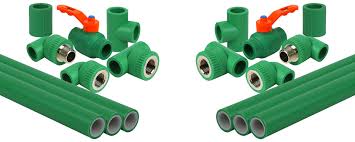Dec . 26, 2024 09:31 Back to list
Manufacturing PPR Pipes for Cold Water Applications in Factories
The Role of PPR Pipes in Cold Water Distribution An Overview for Manufacturers
Polypropylene Random Copolymer (PPR) pipes have emerged as a leading choice in the plumbing and piping industry, particularly for cold water applications. Produced through an innovative polymerization process, PPR pipes combine remarkable durability, chemical resistance, and easy installation, making them a preferred choice for various applications, including residential, commercial, and industrial water distribution systems. This article explores the key characteristics and advantages of PPR pipes and their significance in cold water supply systems, particularly from a manufacturing perspective.
What are PPR Pipes?
PPR pipes, manufactured from polypropylene random copolymer, are designed for transporting cold water and various other fluids. They are characterized by their green or light green exterior, lightweight properties, and smooth inner surface, which enables efficient flow with minimal friction loss. The pipes are available in a range of diameters, accommodating diverse installation needs, from small residential systems to large industrial applications.
Benefits of PPR Pipes for Cold Water Systems
1. Corrosion Resistance One of the primary advantages of PPR pipes is their resistance to corrosion. Unlike traditional metal pipes, which can rust and degrade over time, PPR pipes remain unaffected by harsh water conditions and do not react chemically with water or other fluids, ensuring a longer lifespan and reduced replacement costs for manufacturers and end-users.
2. Smooth Internal Surface The smooth interior of PPR pipes facilitates better flow rates and reduces the chances of mineral deposits accumulating inside the pipes. This feature is especially beneficial for cold water applications, as it helps maintain the quality of the water being transported while minimizing maintenance requirements.
3. Thermal insulation PPR pipes have inherent thermal insulation properties, which help maintain the temperature of cold water. This characteristic is crucial in preventing condensation and thermal loss, particularly in areas where temperature fluctuations occur frequently.
4. Lightweight and Easy to Handle PPR pipes are significantly lighter than their metal counterparts, making them easier to transport and handle during installation. This lightweight nature can lead to lower shipping costs for manufacturers and reduced labor efforts during installation, adding to overall project efficiency.
ppr pipe for cold water factory

5. Flexibility and Ease of Installation The flexible nature of PPR pipes allows for simpler installation. They can be welded to fittings, providing strong and leak-free connections. This ease of installation translates into shorter project timelines and cost-effectiveness for manufacturers and construction teams.
6. Cost-Effectiveness While the initial investment in PPR pipes may be slightly higher than traditional pipes, their long-term benefits, including durability, resistance to wear and tear, and reduced maintenance costs, make them a more economical choice over time.
Applications in Cold Water Supply Systems
PPR pipes are widely used in various cold water applications, including
- Residential plumbing systems Many homes utilize PPR pipes for their plumbing systems, ensuring efficient delivery of cold water to bathrooms, kitchens, and other areas.
- Commercial buildings In commercial and institutional settings, PPR pipes are employed for cold water supply, fire suppression systems, and even for irrigation purposes.
- Industrial applications Factories and manufacturing plants often rely on PPR pipes for transporting cold water, thanks to their ability to withstand varying pressures and temperatures in different environments.
Conclusion
As the demand for effective and efficient water distribution systems continues to rise, the role of PPR pipes for cold water applications has become increasingly significant. Their unique combination of durability, resistance to corrosion, ease of installation, and cost-effectiveness makes them an ideal choice for manufacturers and other stakeholders in the plumbing industry. With ongoing advancements in manufacturing processes and materials, the use of PPR pipes is expected to grow, solidifying their position as a leading solution for reliable cold water distribution systems. As industries evolve and the focus on sustainable, long-lasting plumbing solutions intensifies, PPR pipes will remain at the forefront of innovation in the piping sector.
-
High-Quality PVC Borehole Pipes Durable & Versatile Pipe Solutions
NewsJul.08,2025
-
High-Quality PVC Perforated Pipes for Efficient Drainage Leading Manufacturers & Factories
NewsJul.08,2025
-
High-Quality PVC Borehole Pipes Durable Pipe Solutions by Leading Manufacturer
NewsJul.08,2025
-
High-Quality PVC Borehole Pipes Reliable PVC Pipe Manufacturer Solutions
NewsJul.07,2025
-
High-Quality UPVC Drain Pipes Durable HDPE & Drain Pipe Solutions
NewsJul.07,2025
-
High-Quality Conduit Pipes & HDPE Conduit Fittings Manufacturer Reliable Factory Supply
NewsJul.06,2025

